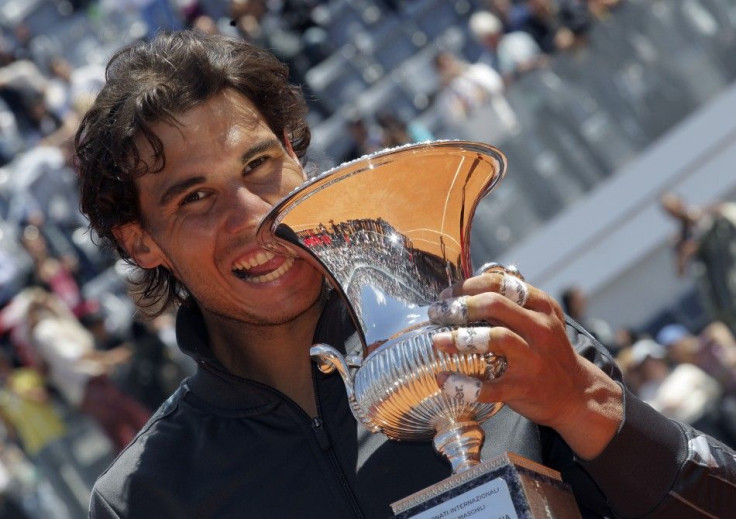French Open 2012 Predictions, Preview: Nadal Favorite, But Djokovic, Federer With Chance To End Dominance

Rafael Nadal heads to his beloved red clay of Roland Garros as favorite for a record seventh French Open crown, but his challengers will also feel, perhaps more so than ever before, that they have a chance of ending the Spaniard's dominance.
Nadal has won two of the three ATP Masters 1000 clay-court events this year and on both occasions recorded straight-sets victories in the final over the man seen as his closest rival, Novak Djokovic.
The victory in Monte Carlo, in particular, cannot be overestimated. After a run of seven straight defeats to Djokovic, all in finals, more than the World No. 1 having shown he had the ability to match and even overcome Nadal physically, Djokovic had gotten into Nadal's head. The dominating win in the principality proved to Nadal, as much as anyone else, that he could still get the better of the relentless Serbian.
Just a week ago, Nadal got the best possible boost before making the trip to Paris with a win in Rome last week that reversed his defeat to Djokovic in the final there last year.
Yet there still purveys a sense that Nadal no longer quite possesses the physically-imposing invincibility that for many years made the French Open more of a procession than a competition.
Djokovic, in particular, will believe that he is in with more than just an outside chance as he looks to complete the Djoker Slam and hold all four majors. Victory would also make Djokovic only the eighth man to complete a Career Grand Slam.
The 25-year-old had one of the best years in the history of the sport in 2011, but does not yet get the same exalted historical comparisons enjoyed by both Roger Federer and Rafael Nadal. Lifting the Coupe des Mousquetaires would force his name into the conversation of the greatest of all time.
But, whereas last year Djokovic arrived in Paris on an incredible unbeaten streak through the first five months of the season, things have not gone quite as smoothly this time around. By mere mortal's standards it has still been a tremendous 2012 to date. A memorable triumph in the Australian Open, as well as a Masters 1000 title in Miami being far from a paltry return.
However, defeats this month on the clay in Madrid and Rome have raised questions about whether Djokovic has lost a fraction of the mental fortitude that has been such a huge part of his ascent to the top of the game.
It would be easy to overlook Djokovic's defeat to countryman Janko Tipsarevic in Madrid as an irrelevance resulting from the furor over the now infamous blue clay. But the level of irritation he showed was evidence of something more than just unease with the surface.
The way in which Roger Federer went about his business in the Spanish capital was an apt demonstration of how to express displeasure, while at the same time getting on with the business of winning a tournament.
And what of Federer?
That victory in Madrid saw the Swiss master back up to No. 2 in the ATP rankings and looking potentially with as good a chance as ever of beating his nemesis Nadal on the terre batue on route to the title in Paris.
But a subsequent semi-final defeat to Djokovic in Rome has knocked his chances in more ways than one. As well as the dent to his belief, crucially it means that Federer enters Roland Garros seeded third, rather than second.
The draw on Friday confirms that Federer will have to beat Djokovic in the last four before likely having to go through Nadal in the final. An unenviable task to put it mildly.
Federer, though, could well still head to Paris with a largely positive mind set. At 30-years-old, he will accept that if he is to add to his record haul of sixteen grand slam titles, Roland Garros remains the unlikeliest destination for it to happen.
There will be an element of the pressure being off and Federer could well relish upsetting the low expectations, as much of the tennis world eagerly awaits a Nadal-Djokovic showdown.
It is difficult to see past the big three in Paris. Andy Murray has often threatened to create a big four in the men's game, but his results this clay-court swing have done nothing to suggest that that he can be a serious threat on the dirt.
If there is to be an outside hope it is likely to come from Tomas Berdych. The Czech has only lost to Nadal, Djokovic and Federer on clay this year and far from disgraced himself on each occasion. If he's in the right frame of mind he could be a real threat in Paris with his thundering forehand. Seeded seven for the tournament, Federer will not relish seeing Berdych in his quarter of the draw.
The admirable David Ferrer is also more than capable of going far. Drawn in Murray's quarter, it would be no surprise to see the tireless Spaniard making it to the last four, before surely falling to his long-time tormentor Nadal in the semi-finals.
And it is Rafael Nadal who should confirm his place as the greatest clay-court exponent of all time by lifting the Coupe des Mousquetaires for a seventh time. Novak Djokovic being the man likely to fall victim in the final.
© Copyright IBTimes 2024. All rights reserved.











